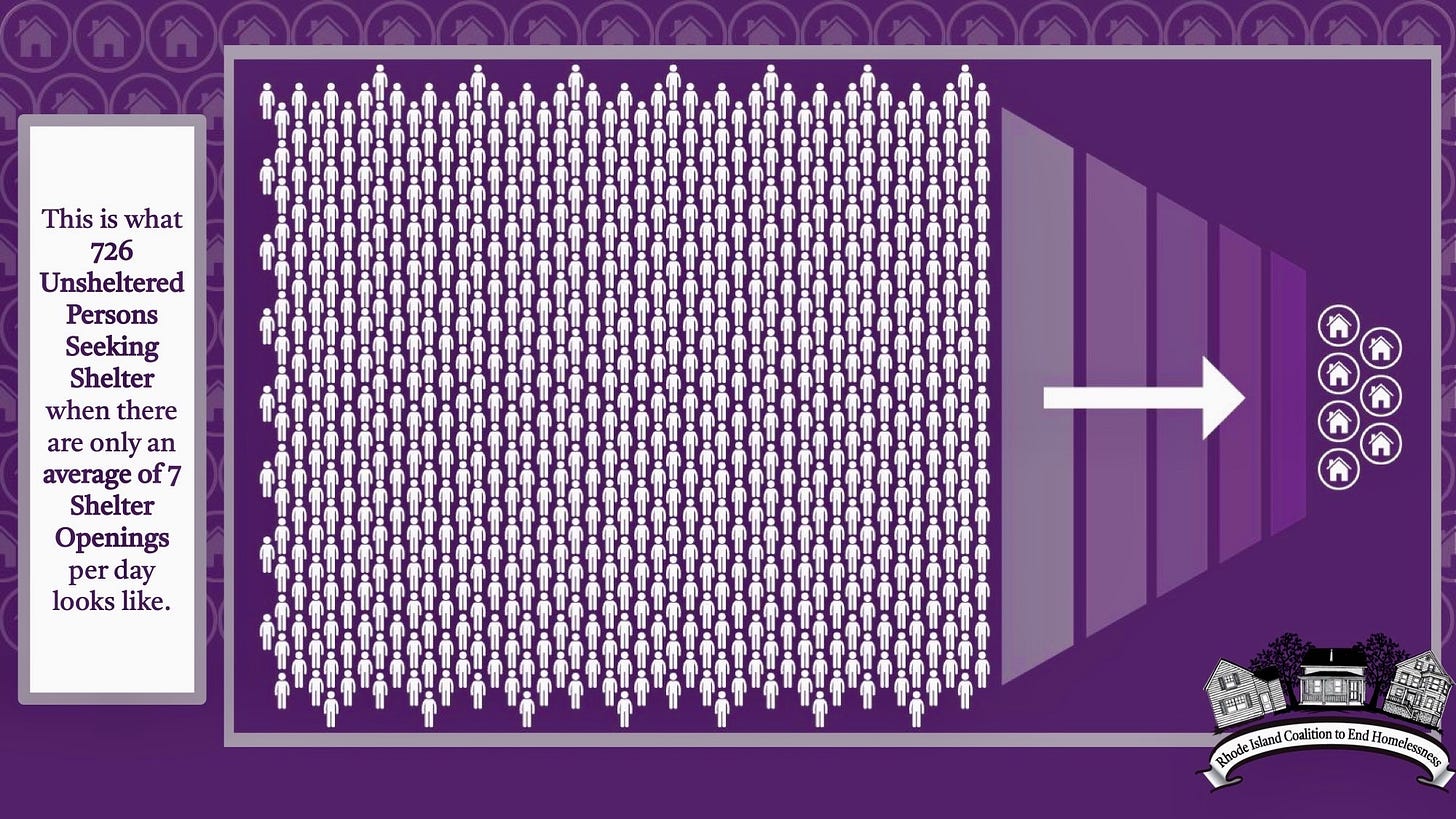The 2023 State of Homelessness in Rhode Island
"...the data presented here largely represents an increase in the number of Rhode Islanders experiencing homelessness," said RI Coalition to End Homelessness interim director Kimberly Simmons.
For the second year in a row, the Rhode Island Coalition to End Homelessness [Coalition] presented stark numbers on the state of homelessness in Rhode Island. “The State of Homelessness in Rhode Island is at a critical state,” said the Coalition’s Interim Director Kimberly Simmons, “While the data presented here largely represents an increase in the number of Rhode Islanders experiencing homelessness, I'm heartened by the fact that we have a good representation tonight of elected officials, advocates, providers, constituents, and people with lived experiences so we all can work towards the end of homelessness in the ocean state.”
That said, the vast majority of Rhode Island's elected officials declined to attend the event. Senator Samuel Bell (Democrat, District 5, Providence), Tiara Mack (Democrat, District 6, Providence), and Representative David Morales (Democrat, District 7, Providence) were the only elected officials in the room. United States Senator Jack Reed [Democrat, Rhode Island] sent comments by video. Clearly, the well-being of the more than 1800 people estimated to be experiencing homelessness in Rhode Island is a low priority for many in our government.
You can watch Director Simmon’s presentation here:
The first part of the event is here:
That 1800 number is interesting. It represents a 72% increase in homelessness since 2019. “Additionally,” said Director Simmons, “since 2019, unsheltered homelessness has increased by 370% in 2022. Rhode Island had the 17th highest per capita homeless count in the nation.
“Over the past four years, 18,499 new people have entered the homeless system,” continued Director Simmons. “That means one out of a hundred Rhode Islanders call through our CES system, which is the call center. Over the past four years, a majority of those individuals did not have a residence before entry. Over 80% of those who entered the system came through the call center. This data highlights the need for homeless prevention services: assisting people before they reach unsheltered homelessness, and catching them in places like correctional services or through healthcare and child welfare systems.”
In September of this year, there were almost 12,000 calls for assistance, from 2,286 unique callers. People in need of shelter are put on an electronic waiting list called the shelter queue. At the end of last month, “726 persons were waiting in the queues, including 65 households with children, 104 households without children, and 314 single adults,” said Director Simmons. “Some of that number, we must acknowledge, are not unhoused. Maybe they are surfing on couches or they could be in a different situation - but they still don't have their own place.”
“It is problematic when you have 726 unsheltered people seeking shelter, but there are only an average of seven shelter openings per day," said Director Simmons, noting that this number does not take into account the new shelter beds coming online through the work of the Rhode Island Department of Housing's Winter Shelter Strategy.
When people leave the shelter, they are not necessarily finding permanent housing. “It's important to note that only 31% of people leaving shelter [found] permanent or temporary destination within the last fiscal year,” said Director Simmons. “50% of people are leaving shelter for an unsheltered or unknown destination. We lose track of them. People may pass away or they go to family.”
At the end of last month, there were 190 households with children, 154 households without children, and 612 households with individuals in the housing queue. They face an average of 113 days in the housing queue, waiting to be referred to housing and 180 days from their housing referral to an actual move-in date.
As bad as all this is, other trends point towards an increase in homelessness. As reported here, last month Providence landlords filed 18% more evictions than in an average pre-pandemic October, and raids on encampments of people experiencing homelessness continue to be driven by uncaring right-wing media and cowardly politicians.
Sadly, solutions will not come quickly. Director Simmons presented the following actions:
State and municipal leaders can continue to:
Develop flexible Housing Problem-Solving resources to prevent and divert homelessness;
Increase the supply of crisis housing and shelter, including innovative models;
Dramatically increase the supply of affordable housing for very low-income households, including permanent supportive housing;
Continue to support state efforts; working together to end homelessness; and,
Treat housing as healthcare to bridge the gap between health and housing stability.
We need the Federal Government to:
Expand Housing Choice Vouchers to an entitlement program (so all who are eligible can receive it);
Increase HUD funding for Homeless Assistance Grants; and,
Continue and expand regulatory waivers, making programs more effective and nimble.
We need Rhode Islanders to:
Call for more affordable housing options and shelter in your city and town;
Ask us to present to local municipalities our State of Homelessness presentation;
Volunteer with local providers to help our unhoused neighbors;
Support our legislative agenda [To be determined];
Donate. Volunteer. Sign up for our e-news; and,
Volunteer for our January 2024 Point in Time Count.
Thank you for reading.
This work only happens because of the generous support of people like you.
Please consider making a small donation.
Share Share Share!





Thank you for your ongoing attention to this, to Mr. Nugent's wellbeing and focus on cowardly politicians who posed themselves as "PROGRESSIVE."